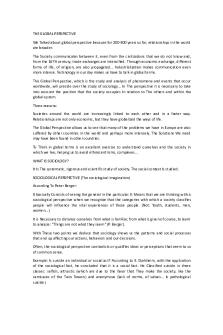The Conflict Perspective and Crime PDF

| Title | The Conflict Perspective and Crime |
|---|---|
| Author | Lara Muster |
| Course | Criminology |
| Institution | Tulane University |
| Pages | 2 |
| File Size | 70.3 KB |
| File Type | |
| Total Downloads | 102 |
| Total Views | 141 |
Summary
The Conflict Perspective and Crime...
Description
The Conflict Perspective and Crime We have discussed Conflict Theory and how it relates to crime previously -Marx -class struggle on economic position -Weber -Elites in government, bureaucracy, and other sectors of social life Those in power define legal and illegal behaviors Behaviors that protect the interests of the powerful tend to be considered legal, while behaviors relevant to the lifestyles of the less powerful are more likely to be considered illegal Feminist Theory and Crime Feminist theory argues that divisions of power are not based on differences in wealth or status Instead, power is based on gender differences and reinforced through patriarchy o Men control institutions like government and law enforcement and create laws and norms that help to keep power in the hands of men From a Feminist Perspective, crime and criminal behavior and the study of crime are just another example of a male-centered part of social life o Men are more likely to be criminals because they are stronger and more aggressive -This narrative reinforces the idea that men are strong and women need to depend on them Typically, only men are studied when criminal behavior is analyzed, while female offenders or crimes committed by women are ignored or seen as less serious Historically most criminologists and social theorists have been men so explanations of criminal behavior are seen through the eyes of men o Men and women see the world in different ways, and this must be realized The way that we see female crime and depict it is problematic and wrong (Orange is the new Black) -this is a direct result of a patriarchal society and keeping women down Labeling and The Conflict Perspective Those who view criminalization, crime, and criminal behavior from a Conflict Perspective focus heavily on Labeling “Crime” is just a label attached to a behavior with clear social sanctions -can be a result of power dynamics or group consensus
What behaviors are labeled “illegal”? Who is labeled “a criminal”? Who does the labeling? What are the consequences of being labeled “a criminal”? -powerful groups and moral entrepreneurs do the labeling If you like the feeling of pain killers, are you a criminal? Or do you have a problem? (PROBLEMATIC LABELING) -upper class doesn’t want their kids being labeled Moral entrepreneurs- groups that have more control in society -they are the reason that “people under 21 cannot drink…- for example) Consequences of being labeled Those who are labeled are more likely to see themselves as “bad” o Labeled criminal -> view self as criminal -> act criminal and associate with criminals -> continue criminal behavior o Primary deviance and secondary deviance Once labeled it is difficult to remove label and people view that person as a criminal and treat them as such o Convicted felons, job opportunities, and civil rights Labels create boundaries between people and groups o Creates advantages for in-group and “non-criminals” o Moral entrepreneurs -being labeled often leads to resistance of that person (person feels like they are being screwed) (criminal acts viewed as resistance to being marginalized and treated unfairly)...
Similar Free PDFs

Crime Control Perspective
- 7 Pages

The Altered Perspective
- 6 Pages

THE Global Perspective
- 38 Pages

The Strategy of Conflict
- 13 Pages

The 5 Conflict model
- 1 Pages

The behavioral perspective
- 2 Pages
Popular Institutions
- Tinajero National High School - Annex
- Politeknik Caltex Riau
- Yokohama City University
- SGT University
- University of Al-Qadisiyah
- Divine Word College of Vigan
- Techniek College Rotterdam
- Universidade de Santiago
- Universiti Teknologi MARA Cawangan Johor Kampus Pasir Gudang
- Poltekkes Kemenkes Yogyakarta
- Baguio City National High School
- Colegio san marcos
- preparatoria uno
- Centro de Bachillerato Tecnológico Industrial y de Servicios No. 107
- Dalian Maritime University
- Quang Trung Secondary School
- Colegio Tecnológico en Informática
- Corporación Regional de Educación Superior
- Grupo CEDVA
- Dar Al Uloom University
- Centro de Estudios Preuniversitarios de la Universidad Nacional de Ingeniería
- 上智大学
- Aakash International School, Nuna Majara
- San Felipe Neri Catholic School
- Kang Chiao International School - New Taipei City
- Misamis Occidental National High School
- Institución Educativa Escuela Normal Juan Ladrilleros
- Kolehiyo ng Pantukan
- Batanes State College
- Instituto Continental
- Sekolah Menengah Kejuruan Kesehatan Kaltara (Tarakan)
- Colegio de La Inmaculada Concepcion - Cebu









